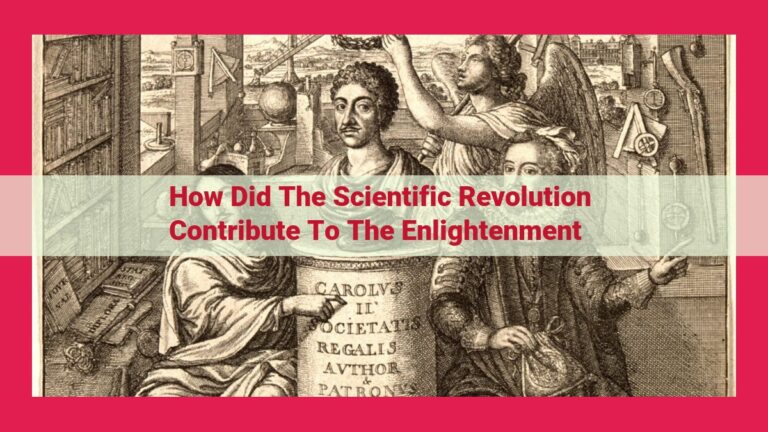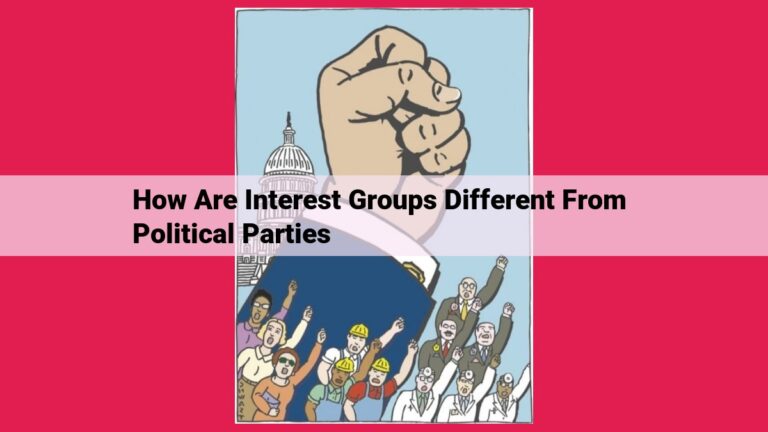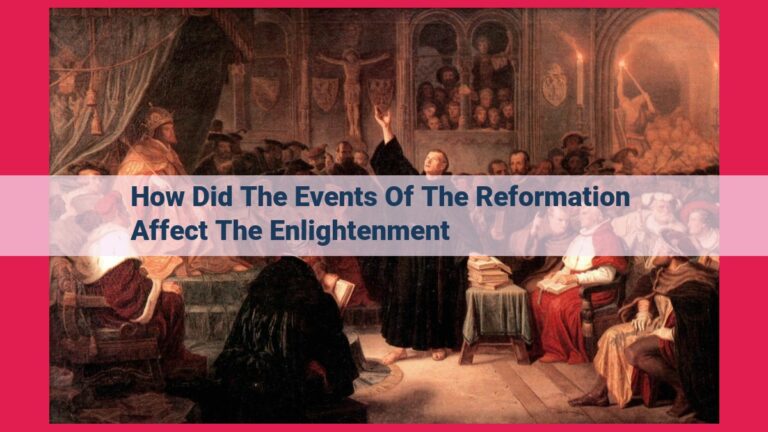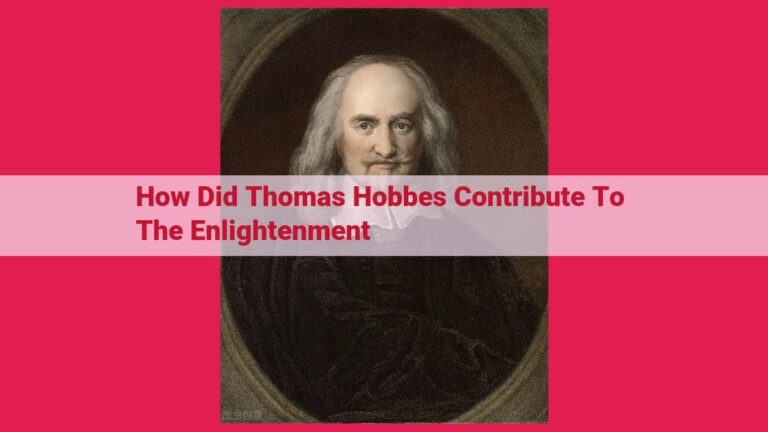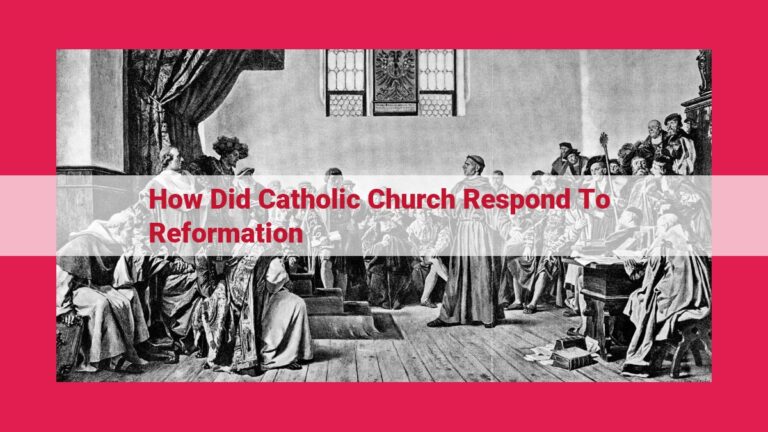The Enlightenment And The American Revolution: Ideas That Sparked A Nation
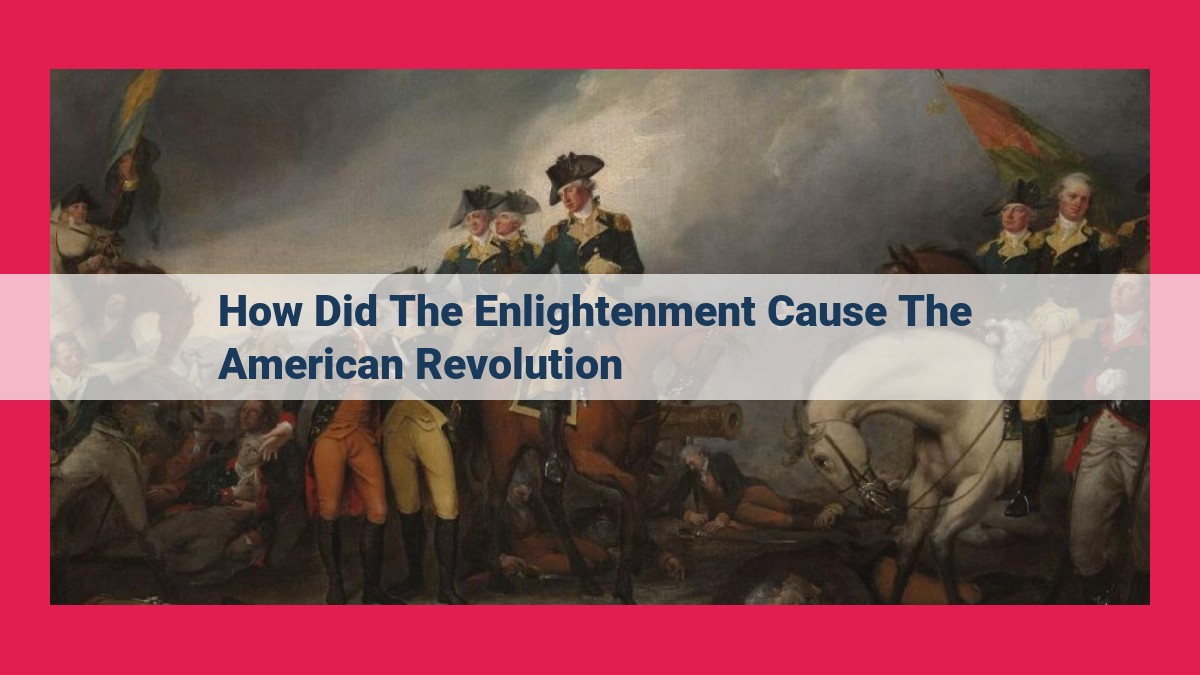
The Enlightenment ignited the American Revolution by fostering a new understanding of reason and rights. Philosophers challenged traditional beliefs, emphasizing natural rights and the importance of the individual. Social contract theories laid the foundation for limited government with consent of the governed, separation of powers, and popular sovereignty. Enlightenment ideals inspired the Declaration of Independence and the Constitution, shaping the ideals of liberty, equality, and the pursuit of happiness that became the driving force behind the revolution.
The Birth of Rationality and Observation: The Dawn of Enlightenment
In the tapestry of human history, the Enlightenment era stands as a transformative chapter, marking a profound shift in our collective mindset. At the heart of this revolution lay rationality and observation, the driving forces that propelled humanity away from the shadows of superstition and towards the embrace of reason.
The Scientific Revolution, a pivotal moment in the 16th and 17th centuries, ignited the flame of rational inquiry. The Scientific Method, a systematic approach to knowledge acquisition, emphasized experimentation and empirical evidence over blind faith and dogma. This new paradigm drastically challenged traditional beliefs and paved the way for a more secular and scientific understanding of the world.
The Scientific Revolution sowed the seeds for the Enlightenment, a philosophical movement that flourished in the 18th century. Enlightenment thinkers, such as René Descartes, Voltaire, and John Locke, placed reason and human experience at the forefront of their intellectual pursuits. They believed that the universe operated according to natural laws that could be deciphered through observation and logic.
This shift in perspective had profound implications for society. It fostered a critical and questioning mindset, encouraging individuals to challenge prevailing norms and seek rational explanations for the world around them. The Enlightenment laid the groundwork for the development of modern science, technology, and the political and social principles that shape our world today.
Natural Rights and Freedoms: The Cornerstone of Enlightenment Thought
In the tapestry of Enlightenment philosophy, the concept of natural rights emerged as a vibrant thread, shaping the political and social fabric of Western civilization. These inherent rights, bestowed upon all individuals by virtue of their humanity, served as a catalyst for revolutionary ideas that would forever alter the course of history.
John Locke, a towering figure of Enlightenment thought, eloquently articulated the theory of natural rights. He posited that all humans possess inalienable rights to life, liberty, and property. These rights, he argued, predated any form of government and could not be rightfully taken away. Locke’s ideas resonated deeply with the colonists in the American colonies, who saw them as a beacon of freedom in the face of British oppression.
Another influential thinker, Thomas Hobbes, approached the concept of natural rights from a different perspective. While acknowledging the existence of these rights, Hobbes argued that individuals must surrender some of them in order to create a stable society. He proposed the idea of a social contract, in which people voluntarily relinquished certain freedoms in exchange for the protection and order provided by a strong government.
The interplay between Locke’s and Hobbes’s ideas set the stage for a profound debate that continues to shape political discourse today. On one hand, the concept of natural rights emphasizes the inherent worth and dignity of every individual. On the other hand, the idea of social contract highlights the need for collective action and the importance of preserving social order.
The Enlightenment’s focus on natural rights found its most potent expression in the Declaration of Independence, the founding document of the United States. This landmark declaration proclaimed that “all men are created equal, that they are endowed by their Creator with certain unalienable Rights, that among these are Life, Liberty, and the pursuit of Happiness.”
The Enlightenment’s embrace of natural rights had a profound impact on the development of democratic societies. It laid the foundation for Constitutions that enshrine the rights of individuals, empowering them to live their lives with freedom and dignity.
Social Contract: The People’s Power:
- Explain Jean-Jacques Rousseau’s theory of government formed with the consent of the governed.
- Analyze Thomas Hobbes’s depiction of government as a powerful Leviathan.
- Discuss how these ideas laid the foundation for limited government and popular sovereignty.
Social Contract: The People’s Power
In the tapestry of Enlightenment thought, the concept of social contract emerged as a pivotal thread, forever transforming our understanding of the relationship between rulers and the ruled.
One prominent voice in this realm was Jean-Jacques Rousseau. He believed that government should not be imposed from above but rather established with the consent of the governed. He envisioned a society where individuals willingly surrendered some of their freedoms to create a secure and harmonious community. This surrender was not unconditional; the government’s power was limited by the terms of the contract, ensuring that it served the people’s interests rather than its own.
In contrast, Thomas Hobbes painted a more somber picture. He saw human nature as inherently selfish and conflict-ridden, requiring a powerful Leviathan of a state to maintain order. According to Hobbes, individuals surrendered their rights to this sovereign in exchange for protection. While this view acknowledged the potential for tyranny, it also recognized the harsh reality of unchecked human behavior.
The interplay between these opposing perspectives laid the foundation for the limited government and popular sovereignty that became hallmarks of the Enlightenment. The American Revolution, fueled by Enlightenment ideals, ignited a profound shift in political thought, establishing a new era where the people held the ultimate authority.
Ultimately, the social contract is a testament to the power of consent. It recognizes that government is not a divine right but a voluntary agreement between those who govern and those who are governed. It sets limits on government power, empowering citizens with the ability to hold their leaders accountable. As the Enlightenment taught us, true power lies not in absolute sovereignty but in the collective voice of a free and sovereign people.
Keeping Power in Check: The Genius of Separation of Powers
In the vibrant tapestry of human history, the Enlightenment stands out as a luminous era of intellectual enlightenment. Among its many profound contributions, the concept of separation of powers emerged as a beacon of balance and stability in governance. This principle, brilliantly conceived by the French philosopher Montesquieu, has profoundly shaped countless constitutions and safeguarded democracies around the globe.
Montesquieu recognized the inherent danger of concentrating power in the hands of a single entity. History bore witness to the tyranny and oppression that inevitably followed such unchecked authority. Thus, he proposed that power be divided among three distinct branches of government: the legislature, the executive, and the judiciary.
By separating these powers, Montesquieu sought to prevent any one branch from becoming too dominant. Each branch was granted specific functions to check the powers of the others. For instance, the legislature (parliament or congress) has the power to make laws, but the executive (president or prime minister) has the power to veto them. Meanwhile, the judiciary (courts) can declare laws unconstitutional, thus limiting the power of both the legislative and executive branches.
The United States Constitution, a towering testament to Enlightenment ideals, meticulously adopted this principle of separation of powers. The Constitution establishes three coequal branches of government: the legislative (Congress), the executive (the President), and the judicial (the Supreme Court). Each branch is independent and possesses its unique responsibilities, duties, and powers.
This checks and balances system ensures that no one branch can overpower the others. It prevents the tyranny of the majority, the dictatorship of the executive, or the judicial activism of the courts. Instead, it fosters a dynamic equilibrium where each branch oversees and moderates the others, thereby safeguarding the rights and liberties of the people.
Limited Government: Protecting Individual Rights:
- Discuss the concept of the rule of law and its significance in limiting government authority.
- Explain the importance of republicanism and the idea of government accountability to citizens.
Limited Government: Protecting Individual Rights
The Age of Enlightenment gave birth to the idea of a government with limited power. This concept arose from the belief that individuals possess inalienable rights, such as life, liberty, and property. To protect these rights, it was crucial to prevent the government from becoming too powerful.
One key principle established during this period was the rule of law. This meant that all citizens, including those in positions of authority, were subject to the same laws. The government could not arbitrarily infringe upon the rights of individuals without due process. The rule of law created a framework for limiting government authority and ensuring that it operated within its prescribed boundaries.
Another important aspect of Enlightenment thinking was the concept of republicanism. Republicanism emphasized the idea of government accountability to the people. It advocated for a system where citizens had a voice in the political decision-making process and could hold their leaders responsible for their actions. This principle further limited the power of government by preventing any one individual or group from wielding absolute authority.
By embracing these principles, the Age of Enlightenment laid the foundation for a government that was limited in its scope and accountable to its citizens. This paved the way for the development of modern constitutional democracies, where the rights of individuals are protected from government overreach.
Power to the People: Popular Sovereignty
The Enlightenment period witnessed the rise of a transformative idea that would forever alter the landscape of governance: popular sovereignty. This principle asserts that the ultimate source of political authority resides with the people themselves. It is not granted by divine right or bestowed upon a select few, but inherent in every individual.
Central to popular sovereignty is the concept of consent of the governed. This tenet holds that no government can claim legitimacy unless it is based on the explicit and voluntary agreement of its citizens. The people have the right to choose their own leaders, enact laws, and shape the policies that govern their lives.
Enlightenment thinkers such as Jean-Jacques Rousseau argued that the best form of government is one formed through a social contract, where the people cede some of their rights in exchange for protection and security. In this arrangement, the government acts as merely an agent of the people, entrusted with their authority.
The principle of popular sovereignty laid the foundation for the emergence of representative government. Instead of direct democracy, where all citizens participate in decision-making, representatives are elected to act on their behalf. This model allows for the practical implementation of popular sovereignty, while ensuring that the voices of all citizens are heard through their chosen representatives.
The transformative power of popular sovereignty cannot be understated. It challenges the notion of authoritarian rule and empowers citizens to shape their own destiny. By instilling the belief that legitimate power flows from the people upwards, it has inspired countless revolutions and movements throughout history, paving the way for a more just and equitable world.
Civic Duty and Government: Republicanism:
- Describe the idea of civic virtue and its importance in political life.
- Explain how representative government and separation of powers ensure that no one branch of government becomes too powerful.
Civic Duty and Government: The Pillars of Republicanism
In the annals of Enlightenment thought, the concept of republicanism emerged as a beacon of governance, upholding the ideals of civic duty and the inherent power of the people. Republicanism envisioned a government where citizens were not mere subjects but active participants in shaping their political destiny.
The Virtuous Citizen
At the heart of republicanism lay the belief in civic virtue, a profound sense of duty and selfless dedication to the common good. Republican thinkers recognized that a flourishing society depended on citizens who were active, engaged, and willing to sacrifice personal interests for the welfare of their community. They believed that individuals had a moral obligation to participate in government, serve on juries, and contribute to the well-being of their neighbors.
Balancing Powers: Representative Government and Separation of Powers
To prevent any one branch of government from becoming overly influential, republicanism espoused the principles of representative government and separation of powers. Representative government empowered citizens to elect individuals who would represent their interests and act on their behalf. Separation of powers divided authority among different branches of government, ensuring that no single entity could wield excessive power. This careful balance of power ensured that the government remained accountable to the people and prevented tyranny from taking root.
Liberty, Equality, and the Pursuit of Happiness: Enlightenment Ideals
The Enlightenment era marked a pivotal shift in human thought, emphasizing rationality, observation, and the power of individuals. At the core of this intellectual movement lay the belief in the natural rights of all people, regardless of their station in life.
Individualism and Natural Rights: The Foundation
One of the defining characteristics of Enlightenment thought was a focus on the individual. Philosophers such as John Locke argued that individuals possess inherent rights that cannot be taken away by government. These rights include the right to life, liberty, and property.
This concept of individualism empowered people to question traditional authority and assert their own agency. It also provided a philosophical basis for the American Revolution, which sought to establish a government that would protect the natural rights of its citizens.
Liberty and Equality: Goals of the American Revolution
Inspired by Enlightenment ideals, the American colonists declared their independence in 1776. Their Declaration of Independence explicitly states that all men are created equal and endowed with certain unalienable rights, including the right to life, liberty, and the pursuit of happiness.
These ideals were not merely abstract concepts but were central to the colonists’ struggle for political and social liberty. They believed that government should be based on the consent of the governed and that individuals should be free to make choices about their own lives.
The Enlightenment’s emphasis on individualism, natural rights, and liberty has had a profound impact on the world. These ideals have inspired revolutions, shaped constitutions, and empowered countless individuals to stand up for their rights. While the pursuit of liberty, equality, and happiness is an ongoing journey, the Enlightenment’s legacy continues to guide us towards a more just and equitable society.
